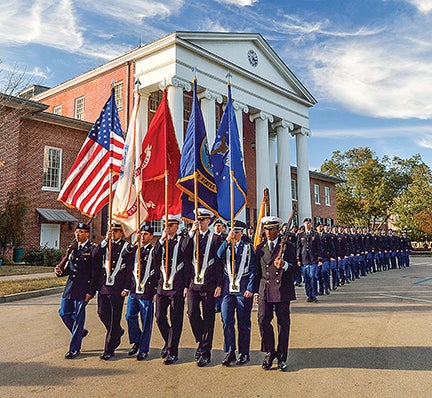UM named top school for military and veteran education
Published 11:06 am Thursday, November 17, 2016

- University of Mississippi The ROTC color guard marches in front of the Lyceum for the Chancellor’s Review. A national publication has named the University of Mississippi as one of the nation’s top schools for military programs and educational opportunities.
By Edwin Smith
University of Mississippi
For a fourth straight year, the University of Mississippi is one of the nation’s top schools for military programs and educational opportunities for veterans, according to Military Advanced Education and Transition’s 2017 Guide to Colleges and Universities.
MAE&T awarded the designation after measuring best practices in military and veteran education. The guide was released last week, and is available online at http://www.mae-kmi.com.
“I was excited to hear that this university is recognized for its commitment to honor our veterans, service members and their families,” said Lt. Col. E. Scott Walton, UM chair and professor of military science and leadership. “With a commission from the University of Mississippi comes unsurpassed academic knowledge and military training.”
This designation, coupled with the university’s designation as a Purple Heart Campus last year, reinforces the hard work done by administration, faculty and staff to assist ROTC students in the successful pursuit of their dreams, he said.
“The university, from the top down, provides outstanding support to the military,” Walton said. “Thanks to that support, all of the cadets, midshipmen and Marines that graduate and receive a commission from University of Mississippi are extremely well-prepared to lead in our nation’s military.
“I would like to thank the university – not only as the department chair of Army ROTC here – but as a service member who sees firsthand the support this university renders.”
The guide presents results of a questionnaire of the military-supportive policies enacted at more than 600 institutions, including private, public, for-profit, not-for-profit, four-year and two-year colleges. The 2017 Guide to Colleges & Universities arms students with information about institutions that go out of their way to give back to the country’s men and women in uniform.
In its 10th year of publishing the guide, MAE&T was the first publication to launch a reference tool of this type. This year, institutions were evaluated on their military culture, financial aid, flexibility, general support, on-campus support and online support services.
Each school’s performance rating by category is represented by an easy-to-recognize dashboard. This enables prospective students to quickly target schools that follow best practices in military education, and then put these in context with other academic or career considerations.
With input from an advisory board of educational and government experts, and criteria based on recommendations from the Department of Veteran’s Affairs and military services, MAE&T’s Guide to Colleges and Universities provides the foundational information a prospective student can use in framing his or her educational needs.
“Our goal is to be a dynamic resource for active service members and those who have moved from the military to their civilian careers, helping them find the school that best fits their plans for the future,” said Kelly Fodel, MAE&T editor. “We think this year’s guide is our most comprehensive to date, thanks to our newly established advisory board.
“The board evaluated the drafts of the questionnaire, made pages of notes and suggestions and helped to redefine questions for clarity. We thank them for their thoughtful edits and additions to our process.”
The 2017 guide is printed in the December issue of Military Advanced Education &Transition, and it is also published in http://militaryfriendly.com/, a searchable database online. The website made the announcement earlier to help Military Friendly Schools and Employers maximize their coverage after Election Day and in time for Veterans Day activities.
The guide gives students access to all the survey questions and answers provided by the schools, as well as explanations about critical issues such as activation and deployment policies, withdrawal policies, scholarship and financial aid information and important support information.
“While we realize that all schools are unique, we focus our annual survey on the best practices that make a true difference to service members and student veterans,” Fodel said. “These best practices have been asserted by various higher education groups and reinforced by veteran groups, and we consider our survey to be the most detailed and informative in the industry.”
Visit http://www.mae-kmi.com for online access to MAE&T’s 2017 Guide to Colleges and Universities, or pick up a copy of the December issue of Military Advanced Education & Transition.





